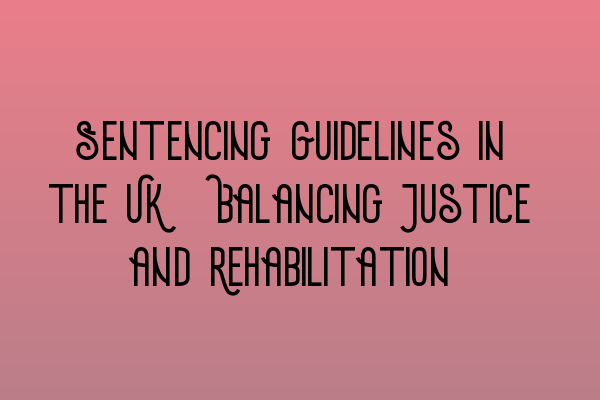Sentencing Guidelines in the UK: Balancing Justice and Rehabilitation
When it comes to criminal law in the UK, one crucial aspect that must not be overlooked is the issue of sentencing guidelines. Sentencing guidelines provide a framework for judges and magistrates to determine appropriate sentences for different offenses. They play a vital role in maintaining consistency, fairness, and transparency in the criminal justice system. In this article, we will delve into the concept of sentencing guidelines and explore how they balance the ideals of justice and rehabilitation.
The Purpose of Sentencing Guidelines
The primary purpose of sentencing guidelines is to ensure that similar offenses receive similar punishments. By establishing a set of principles and factors to consider, these guidelines guide judges in making informed decisions about sentencing. They take into account various factors such as the severity of the offense, the offender’s criminal history, and any aggravating or mitigating circumstances.
Moreover, sentencing guidelines aim to strike a balance between punishment and rehabilitation. While punishment serves to deter future criminal behavior and protect society, rehabilitation seeks to reform offenders and reintegrate them back into the community as law-abiding citizens. By emphasizing both retribution and correction, these guidelines play a crucial role in achieving a fair and effective criminal justice system.
Challenges in Sentencing
However, the task of sentencing is not without challenges. Judges must carefully weigh the objectives of justice and rehabilitation, taking into account the specific circumstances of each case. The sentencing guidelines provide a starting point, but judges also need to consider individual factors to ensure just outcomes. This balancing act can be complex, as the punishment should fit the crime while also addressing the underlying causes of criminal behavior.
Additionally, the evolving nature of crime and societal values presents an ongoing challenge in sentencing. Guidelines need to adapt to changing circumstances to ensure they remain relevant and reflective of contemporary standards. This flexibility allows the system to address emerging forms of crime and adopt new mechanisms for rehabilitation.
Public Perception and Accountability
The importance of public perception and accountability in the criminal justice system cannot be overstated. Sentencing guidelines play a significant role in ensuring public confidence in the fairness and consistency of sentencing decisions. When the public perceives sentencing to be arbitrary, it erodes trust in the system.
Sentencing guidelines provide transparency by outlining the factors considered in determining the appropriate sentence. This transparency helps assure the public that decisions are not made arbitrarily or based on personal biases. By promoting consistency and accountability, these guidelines contribute to a justice system that society can trust.
The Role of Legal Professionals
Legal professionals, including solicitors, have a crucial role to play in understanding and applying sentencing guidelines. As a solicitor at SQE Criminal Law & Practice Law UK, it is essential to stay up-to-date with the latest guidelines and developments in sentencing law. This knowledge enables you to provide the best possible representation and advice to clients.
If you are preparing for the SQE 1 exams, check out our SQE 1 Practice Exam Questions and SQE 1 Practice Mocks FLK1 FLK2 to test your knowledge and enhance your understanding of criminal law.
Continuing Education: SQE 2 Preparation Courses
For aspiring solicitors looking to further their legal career by taking the SQE 2 exams, SQE Criminal Law & Practice Law UK offers comprehensive SQE 2 preparation courses. These courses cover a wide range of legal topics, including sentencing guidelines, to equip you with the necessary skills and knowledge to excel in your profession.
Furthermore, if you are interested in understanding the fundamentals of criminal law and preparing for the SQE 1 exams, SQE Criminal Law & Practice Law UK also provides SQE 1 preparation courses. These courses are designed to help you build a solid foundation in criminal law and enhance your chances of success in the exams.
Finally, for information on upcoming SQE exam dates, make sure to check out the SRA SQE Exam Dates to plan your preparation effectively.
In conclusion, sentencing guidelines in the UK strike a delicate balance between justice and rehabilitation. They provide a structured framework for judges and magistrates to determine appropriate sentences, ensuring consistency and fairness in the criminal justice system. By promoting transparency and accountability, these guidelines contribute to public confidence in the system. As legal professionals, understanding and applying these guidelines are critical to providing effective representation and advice to clients. Stay informed, stay knowledgeable, and keep striving for justice and rehabilitation in the UK’s criminal justice system.
